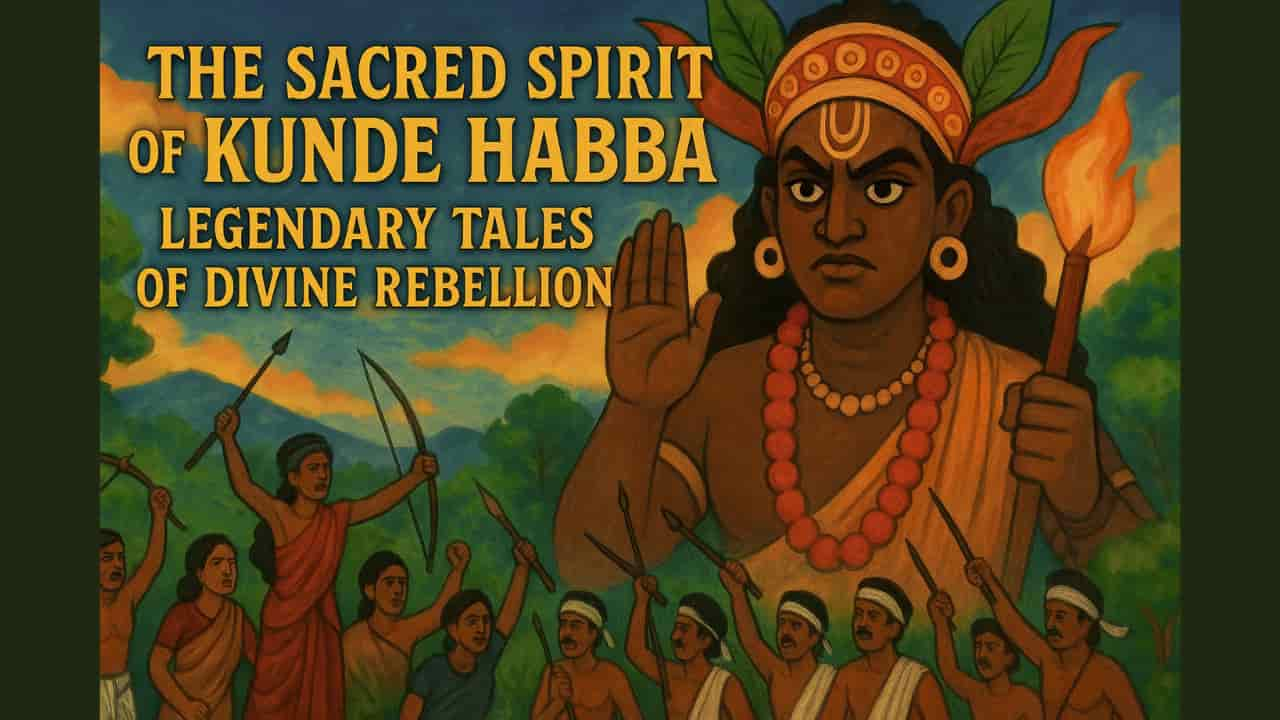
Where the Gods Are Cursed with Love
In the misty hills of Coorg, where the forests breathe and the rivers hum ancient songs, there is a festival unlike any other. It is not marked by grandeur or gold, but by laughter, mockery, and a sacred kind of irreverence.
This is Kunde Habba, the festival where gods are cursed, not out of anger, but out of devotion. Where the divine is not feared, but teased. Where the sacred is not distant, but deeply human.
The Myth of Abandonment
The roots of Kunde Habba lie in a story of betrayal, not between mortals, but between gods and their people. Long ago, the forest-dwelling tribes of Coorg were devoted followers of Lord Ayyappa, the celibate warrior-god of Sabarimala.
They offered him honey, wild fruits, and their unwavering faith. In return, they believed he would protect them from wild beasts, from disease, from despair. But one year, the rains failed. The crops withered. The forest grew silent. The people cried out to Ayyappa, but he did not come. He had, they believed, abandoned them. And so, they turned their grief into ritual defiance.
The Ritual of Reversal
Kunde Habba is celebrated in March or April, just before the forest begins to bloom again. It is a time of transition, from drought to rain, from silence to song, from despair to defiance.
The rituals begin with the gathering of the community. Men and women paint their faces, wear leaves and feathers, and carry wooden clubs called kundes. These are not weapons of war, but symbols of protest, sacred tools to strike the earth and awaken the gods.
They dance through the village, shouting mock curses at the deities. “Where were you when we cried?” “Why did you sleep while we starved?” “Come down from your throne and walk with us!”
The Sacred Satire
What makes Kunde Habba so unique is its tone, playful, theatrical, and deeply emotional. The people impersonate the gods, mimicking their mannerisms, exaggerating their flaws, and even mocking the priests and rituals.
But beneath the laughter lies a wound, the memory of abandonment, the ache of unanswered prayers. And beneath that wound lies a bond, the unbreakable thread between the divine and the devotee.
In mocking the gods, the people are not rejecting them. “We are not afraid of you,” they say. You are a part of us. You are also a part of us.
The Forest as Temple
Kunde Habba is not celebrated in temples. It is celebrated in the forest, the original shrine of the tribal soul. The trees are the pillars. The sky is the dome. The earth is the altar.
The forest is not just a backdrop. It is a participant.
- The wind carries the chants.
- The birds echo the laughter.
- The soil absorbs the footsteps of the dancers.
In this sacred space, the boundary between human and divine dissolves. The gods are not statues. They are stories, songs, and shadows in the trees.
The Power of Emotional Catharsis
Kunde Habba is more than a festival. It is a release. For people who have lived on the margins of geography, of caste, of history, it is a way to speak their truth.
It is a form of emotional catharsis, where the community comes together to laugh, cry, and heal. It is a reminder that spirituality is not always serene. Sometimes, it is raw, wild, and unapologetically honest.
The Humanization of Gods
In most traditions, gods are placed on pedestals, perfect, distant, untouchable. But in Kunde Habba, the gods are humanized.
They are flawed. They make mistakes. They forget. And they are reminded.
This humanization is not disrespect. It is recognition. It says: “If you are divine, then you must understand our suffering. If you are powerful, then you must be accountable. If you are sacred, then so are we.”
The Role of Women
Women play a vital role in Kunde Habba. They sing songs that mock male gods, question their decisions, and even challenge their masculinity. They do so with laughter, but also with truth.
In a world where women are often silenced in religious spaces, Kunde Habba gives them a voice, loud, lyrical, and fearless. They become the keepers of memory, the carriers of protest, the priestesses of satire.
The Dance of the Kundes
The wooden clubs, the kundes, are not just props. They are ritual instruments. They are struck against the ground in rhythm, creating a beat that echoes through the forest.
Each strike is a question, a demand, a prayer. The dance is wild, circular, and communal. It is not choreographed. It is felt. It is a dance of defiance, but also of devotion.
The Feast of Forgiveness
At the end of the festival, the curses stop. The masks are removed. The kundes are laid down. The people gather for a feast, a meal shared by all, regardless of age, gender, or status.
There is no hierarchy. Only harmony. The gods are thanked. The earth is blessed. The community is whole again. The rebellion ends not in punishment, but in forgiveness.
A Festival for the Forgotten
Kunde Habba is not widely known. It is not televised. It is not sponsored. It does not seek attention. But it deserves to be remembered. It is a festival for those who have been forgotten by gods, by governments, by history.
It is a reminder that faith is not submission. It is dialogue. It is daring. It is the courage to speak, even when the heavens are silent.
The Spiritual Power of Satire
In a world where religion is often solemn, Kunde Habba teaches us the spiritual power of satire. It shows us that laughter can be sacred. That protest can be prayer. That irrelevance can be a form of reverence.
It invites us to rethink our relationship with the divine, not as subjects, but as companions. It reminds us that the gods do not need flattery. They need honesty.
The Echoes of the Forest
Even after the festival ends, the forest remembers.
- The trees hold the echoes of the chants.
- The soil carries the rhythm of the dance.
- The wind whispers the names of the gods, not in fear, but in familiarity.
And somewhere, in the heart of the hills, a child picks up a wooden kunde and laughs, not at the gods, but with them. Because in Kunde Habba, the divine is not above us. It is within us.
It is in our questions, our courage, our cries. It is in the freedom to speak, to mock, to mourn, and to mend. It is in the sacred right to hold the gods accountable, not to diminish them, but to remind them of their promise. In this rebellion, there is reverence. In this laughter, there is longing. And in this festival, there is a truth older than temples: that the divine listens best when we speak from the heart.

